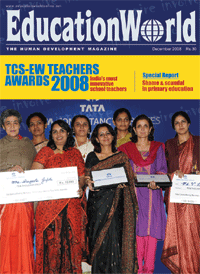Private schools surprise
 It was a pleasure to read the cover story ‘India’s most innovative school teachers’ (EW December). Congratulations to EducationWorld and Tata Consultancy Services for celebrating and rewarding teaching talent across the country, because teachers deserve a lot more than the traditional pat on the back.
It was a pleasure to read the cover story ‘India’s most innovative school teachers’ (EW December). Congratulations to EducationWorld and Tata Consultancy Services for celebrating and rewarding teaching talent across the country, because teachers deserve a lot more than the traditional pat on the back.
Teaching is a profession which requires constant innovation to involve students with the learning process. The profiles of the eight finalists is sure to inspire other teachers to make learning a happy experience for children. However I am surprised that all eight finalists were from private schools. Though I am not questioning the merit of their achievements, their selection in a country where over 90 percent of schools are government-run, sends the message that classroom innovations happen only in private schools.
I am a product of a municipal government school in Bangalore, and fondly recall the simple teaching aids our teachers innovated to enliven the classroom. In private schools, teachers have the luxury of enabling environments to create new teaching methods and materials. In government schools, teachers have to work in abysmal conditions and put up with constantly interfering education officials. Obviously their achievements deserve more commendation than of private school teachers.
I request you to take this award to government schools as well, so that the innovations of their teachers can be brought into the national limelight.
Sharada Kumar
Bangalore
R.V. Raghavendra Rao, a government (Jawahar Navodaya Vidyalaya) school teacher, was adjudged a winner of this award in 2007 — Editor
Faculty selection process
I read your cover story ‘India’s most innovative school teachers’ (EW December) with great interest. Though you must be commended for honouring India’s teachers, I must take issue with your selection process. I strongly believe that students and principals should judge their teachers. The judges’ panel didn’t consist of either.
Teachers live and work for their students, and it is unfair to exclude them from an award which celebrates teaching talent. In the second round, you could have invited essays from students detailing their experiences of the short-listed teachers. That would, I believe, give the judges a clear indication of whether the teacher is able to translate her ideas effectively in the classroom.
Moreover, I notice that all the eight finalists were women. I’m sure there are quite a few male teachers who perform brilliantly in classrooms. Is the award open only to women school teachers? Please clarify.
Satish Kulkarni
Mumbai
Two of the three judges were experienced former school teachers. The annual TCS-EW Teachers Awards are open to all teachers — Editor
Gloomy scenario
The special report ‘Shame and scandal in primary education’ (EW December) made for shocking reading. We have truly reached a tipping point, and need to act urgently to stem the rot in public primary education. Objective and critical examination of reports, especially those published by government-funded organisations such as NUEPA, are a must. I want to congratulate Dilip Thakore for bringing out the real truth about primary education in India.
It has become routine for Indian politicians and government officials to mislead citizens with annual reports boasting the “success” of publicly-funded school and education programmes. Yet quite clearly, as a nation, we have failed to provide minimally acceptable quality primary education to our children. As you rightly argue, an increase in enrollment numbers doesn’t translate into successful learning outcomes. And 60 years after independence, it’s appalling that over 150,000 government primaries don’t provide drinking water facilities, and 500,000 don’t have lavatories. This is indeed a very gloomy situation.
Suma Agarwal
Delhi
Electronic media disservice
I was sorry to read about the sad demise of Mr. Rohinton Maloo, a member of EducationWorld’s Board of Advisors (EW December). Although I had never met him, I had heard about his many positive and proactive contributions in the world of media. You have summed his distinguished career in very apt words.
I also read your editorial ‘Disservice of faux intellectuals’ in which you have condemned two-faced celebrities and socialites who seldom think about the “greater good of the nation and society”. Nowadays it is the electronic media that propagates and celebrates socialites as “intellectuals”.
Dr. Arun Nigavekar
Pune
Surprising omissions
In your 9th anniversary cover story ‘50 leaders redefining Indian education’ (EW November), you’ve featured numerous achievers of Indian education — an excellent endeavour to acknowledge talent. I am the proud teacher of one of the leaders featured by you — Dr. Ishari Ganesh, and a close associate of the legendary Chennai-based educationist Dr. Y.G. Parathasarathy.
Though in the Letter from the Editor you have said that the list “is illustrative and not exhaustive,” I’m surprised that eminent educationists right under your nose in Bangalore — Chenraj Jain, promoter of the Jain Group of Institutions and Dr. K.P. Gopalakrishna of the National Public School group — failed to make the list.
V. Venkatachalam on e-mail